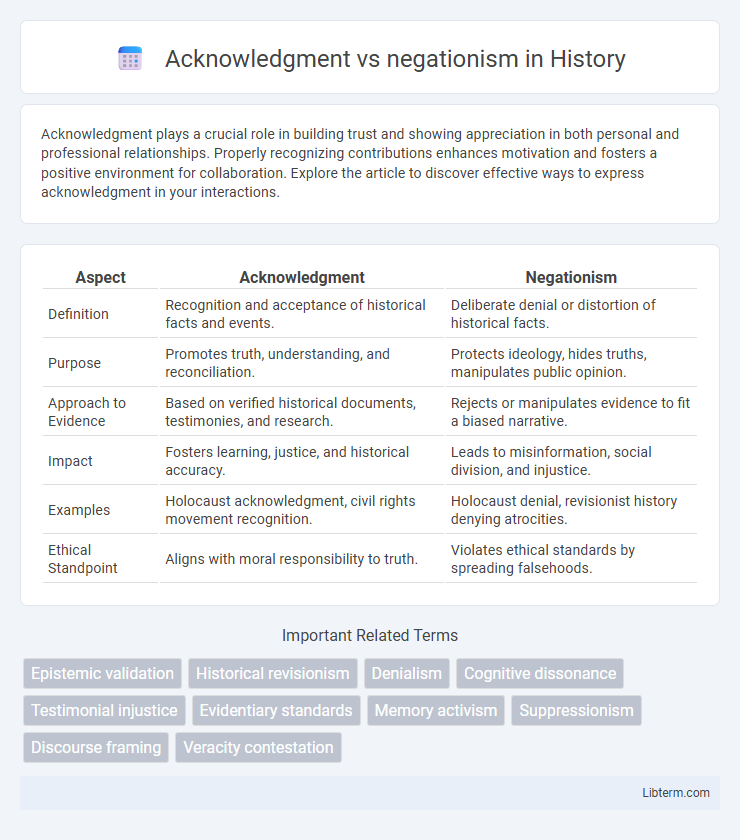Acknowledgment plays a crucial role in building trust and showing appreciation in both personal and professional relationships. Properly recognizing contributions enhances motivation and fosters a positive environment for collaboration. Explore the article to discover effective ways to express acknowledgment in your interactions.
Table of Comparison
| Aspect | Acknowledgment | Negationism |
|---|---|---|
| Definition | Recognition and acceptance of historical facts and events. | Deliberate denial or distortion of historical facts. |
| Purpose | Promotes truth, understanding, and reconciliation. | Protects ideology, hides truths, manipulates public opinion. |
| Approach to Evidence | Based on verified historical documents, testimonies, and research. | Rejects or manipulates evidence to fit a biased narrative. |
| Impact | Fosters learning, justice, and historical accuracy. | Leads to misinformation, social division, and injustice. |
| Examples | Holocaust acknowledgment, civil rights movement recognition. | Holocaust denial, revisionist history denying atrocities. |
| Ethical Standpoint | Aligns with moral responsibility to truth. | Violates ethical standards by spreading falsehoods. |
Introduction to Acknowledgment and Negationism
Acknowledgment involves recognizing and validating historical events or social realities based on factual evidence and consensus, fostering truth and reconciliation. Negationism, in contrast, deliberately denies or distorts such facts, often to rewrite history or evade responsibility, undermining collective memory and justice. Understanding these concepts is crucial for addressing contested historical narratives and promoting informed societal dialogue.
Defining Acknowledgment in Historical Contexts
Acknowledgment in historical contexts involves recognizing and accepting documented events and truths supported by evidence, such as acknowledging genocides or historical injustices. It requires a commitment to factual accuracy and moral responsibility towards victims and affected communities, fostering reconciliation and education. Defining acknowledgment contrasts sharply with negationism, which denies or distorts these established facts for ideological or political purposes.
Understanding Negationism and Its Tactics
Understanding negationism involves recognizing its tactics of deliberately distorting, denying, or minimizing historical facts, often related to atrocities or crimes against humanity. This approach contrasts with acknowledgment, which commits to confronting and accepting verified historical truths to promote reconciliation and prevent repetition. Negationism employs methods such as selective evidence use, false equivalencies, and conspiracy theories to undermine legitimate historical narratives and hinder justice.
The Psychological Roots Behind Acknowledgment and Negationism
The psychological roots behind acknowledgment and negationism stem from cognitive dissonance and identity protection mechanisms, where individuals recognize facts that align with their beliefs to reduce internal conflict. Acknowledgment often arises from openness to new information and empathy, fostering reconciliation and learning. Negationism, conversely, is driven by denial and motivated reasoning, as individuals reject uncomfortable truths to preserve existing worldviews and avoid psychological distress.
Key Examples of Acknowledgment in Modern History
Acknowledgment in modern history involves openly recognizing events such as the Holocaust by Germany and apartheid in South Africa, reflecting accountability and reconciliation efforts. Key examples include Germany's extensive memorial culture and South Africa's Truth and Reconciliation Commission, which serve as models for confronting past atrocities. These acknowledgments contrast sharply with negationism, where denial or distortion of historical facts undermines justice and memory.
Notorious Cases of Negationism Worldwide
Notorious cases of negationism worldwide include Holocaust denial in Europe, the Armenian Genocide denial in Turkey, and the denial of the Rwandan Genocide in some political circles. Acknowledgment involves recognizing historical facts and atrocities, fostering healing and education, while negationism actively distorts or denies these events, undermining justice and truth. These contrasting approaches significantly impact collective memory, human rights policies, and international relations.
Societal Impacts of Acknowledgment vs Negationism
Acknowledgment of historical atrocities fosters societal healing, promotes justice, and strengthens democratic values by confronting past wrongs and fostering inclusive narratives. In contrast, negationism undermines social cohesion, perpetuates misinformation, and inhibits reconciliation, often leading to intergroup conflicts and the erosion of trust in institutions. The societal impacts of acknowledgment versus negationism significantly influence collective memory, identity formation, and the potential for peaceful coexistence.
The Role of Education in Combating Negationism
Education plays a crucial role in combating negationism by promoting critical thinking and historical awareness, ensuring accurate representation of documented events. Incorporating comprehensive curricula that address historical atrocities and denial tactics empowers students to recognize and challenge distortions of truth. Emphasizing testimonies, primary sources, and interdisciplinary studies strengthens societal resilience against negationist narratives.
Legal and Ethical Implications of Both Approaches
Acknowledgment involves recognizing historical facts and injustices, promoting transparency and reconciliation through legal frameworks such as truth commissions and reparations, which uphold human rights and foster social trust. Negationism, or denial of historical atrocities, undermines justice and violates ethical principles by obstructing accountability, often leading to legal consequences including sanctions or prosecutions under laws against hate speech and genocide denial. Both approaches significantly impact societal healing and the rule of law, with acknowledgment supporting ethical responsibility and legal recognition, while negationism perpetuates harm and impedes legal redress.
Moving Forward: Encouraging Acknowledgment Over Negationism
Encouraging acknowledgment over negationism is essential for healing historical wounds and fostering social cohesion. Acknowledgment involves recognizing past injustices and validating victims' experiences, which helps build trust and promotes reconciliation. Moving forward requires collective commitment to truth-telling and education, enabling societies to learn from history and prevent the repetition of atrocities.
Acknowledgment Infographic

 libterm.com
libterm.com